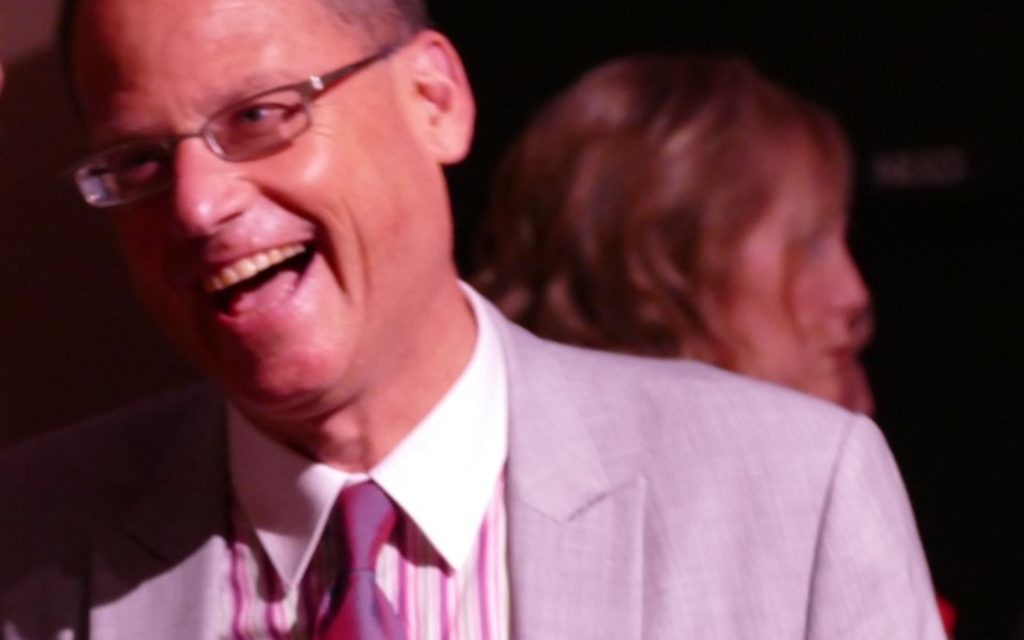Eric Robbins: Imagine Federation as Limmud
If you want an idea of the transformation incoming CEO Eric Robbins has in mind for the Jewish Federation of Greater Atlanta, just check out Limmud, the free-form, no-hierarchy, communal learning movement he and Jodi Mansbach brought to Atlanta.
“If you look at the values and what Limmud has been able to do — Limmud is a place where titles are dropped, where everybody is invited to come with whatever they want to teach. … Some people might teach something that is very traditional, and someone might teach something that’s very radical, and everybody’s treated with respect and dignity, and it’s free will,” Robbins said in an interview Friday, May 6, the day after the Federation board ended nine months of speculation about Michael Horowitz’s successor by hiring the CEO of Camp Twin Lakes.
“I think that those values and so much of what I’ve come to love in Limmud … are very much the values and the atmosphere and traditions and the culture that I’d like to create in this community,” Robbins said.
Get The AJT Newsletter by email and never miss our top stories Free Sign Up
After more than 10 years of expansion at Twin Lakes, the 53-year-old nonprofit professional isn’t taking the top job at Federation and arguably in Atlanta’s Jewish community just to maintain the status quo.
Robbins said he gave up “the best job you could possibly imagine” for the chance to have a wider impact on a Jewish community he has loved since he traveled from Pittsburgh to Camp Barney Medintz for the summer when he was 10 years old.
He wasn’t looking to leave Camp Twin Lakes, but when Federation contacted him about the CEO’s position, he was pleased to find that the leadership recognized the need to change. “I said, ‘Are you interested in transforming the organization?’ They said, ‘We have no choice but to transform it.’ ”
The current Federation model is no longer relevant to much of the community and doesn’t speak to the millennial generation, Robbins said. “It’s at a time where it really needs to change, and that’s exciting.”
The flaws begin with the organization’s focus on fundraising — an important function that it must improve but that should not be its primary purpose, he said. “I really think it’s community building first, and that’s what I love to do.”
Because the mission is building community, Federation needs to be a neutral ground for different beliefs and opinions within the spectrum of support for Israel while the organization itself stays out of politics, Robbins said.
Federation, he said, should be the convener of all the elements that make up Jewish Atlanta to develop a vision of where the community of more than 120,000 people is going and how it’s going to get there.
The opportunity for transformation exists in part because of transitions across Jewish Atlanta. Jewish Family & Career Services and the Marcus Jewish Community Center are among the major organizations with new leadership. Several of Atlanta’s leading synagogues also have brought in new rabbis, including Robbins’ home congregation, Shearith Israel, where Rabbi Ari Kaiman takes the pulpit this summer.
Although Robbins’ only direct involvement with Federation has been as a volunteer, “my other jobs have prepared me for what I think this job needs.”
He has experience in programming, fundraising, lay leader and staff development (“part of my signature skill”), and relationship building. His whole career before Camp Twin Lakes was in Jewish communal service, and even Twin Lakes, founded by Doug Hertz (who Robbins said “defines leadership in its purest form”), is closely connected to the Jewish community.
Robbins said his inexperience with the Federation nitty-gritty will enable him to see operations with fresh eyes.
He has ideas about uniting the community around issues of social justice and action, helping synagogues be more innovative in programming and membership models, seeking opportunities for small and shared communal spaces and even a Jewish farm space, and helping fill the gaps in programming needs, perhaps by supporting startup organizations.
He hopes to learn by studying and working with organizations outside the Jewish community, from those that are similar to Federation in their need to connect with groups across the metro area (such as the Atlanta Regional Commission, the United Way and the Community Foundation for Greater Atlanta) to those he believes have gone through impressive transformations (such as the Atlanta History Center).
But while Robbins hopes for dramatic results, he does not intend to act in haste. After Federation’s lengthy period without a CEO, he plans to focus internally and rally the staff behind the shared mission to revitalize Federation, followed by a deep process that incorporates as many people and organizations as possible to develop a three-to-five-year plan.
“The traditional things aren’t going away quickly,” he said.






comments